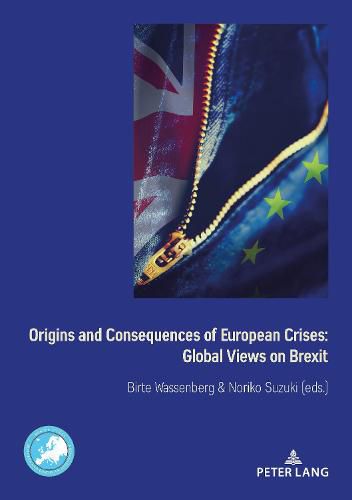Readings Newsletter
Become a Readings Member to make your shopping experience even easier.
Sign in or sign up for free!
You’re not far away from qualifying for FREE standard shipping within Australia
You’ve qualified for FREE standard shipping within Australia
The cart is loading…






This title is printed to order. This book may have been self-published. If so, we cannot guarantee the quality of the content. In the main most books will have gone through the editing process however some may not. We therefore suggest that you be aware of this before ordering this book. If in doubt check either the author or publisher’s details as we are unable to accept any returns unless they are faulty. Please contact us if you have any questions.
Almost sixty years after the signature of the Treaty of Rome in 1957 creating the European Community), a Member-State, the United Kingdom, has for the first time in history decided to leave the European Union. The yes to leave vote during the British referendum on 26 June 2016 led to the use of Article 50 of the EU Treaty triggering off a long period of negotiations between the UK and the EU, which was overshadowed by a permanent struggle between the options of a deal or a no-deal . The Withdrawal Agreement was finally signed on 24 January 2020 and Brexit actually took place on 31 January 2020 - more than three and a half years after the referendum. It is not surprising that a lot of analyses have been put forward to explain the British electoral result, mainly from the perspective of political sociology. However, there has been less research so far on the deeper roots of Brexit as a historical and political process and its development from the start of the referendum campaign until the end of the negotiations between the UK and the EU, nor on its possible social, economic, legal and (geo)political consequences.
In order to examine the origins and consequences of Brexit, this publication develops two original perspectives. On the one hand, it has taken a pluridisciplinary approach comparing the point of views of sociologists, political scientists, legal experts and historians. On the other hand, it has adopted a global approach by comparing the analyses of Japanese, Canadian, American and European researchers. These Global Views on Brexit regroup the contributions to an international Conference on The Consequences of Brexit organised on 6-7 December 2018 in Strasbourg, in the framework of the Jean Monnet project on Crises in European Border Regions supported by the Erasmus+ Programme of the European Union (EU) for the period from 2018-2020.
$9.00 standard shipping within Australia
FREE standard shipping within Australia for orders over $100.00
Express & International shipping calculated at checkout
This title is printed to order. This book may have been self-published. If so, we cannot guarantee the quality of the content. In the main most books will have gone through the editing process however some may not. We therefore suggest that you be aware of this before ordering this book. If in doubt check either the author or publisher’s details as we are unable to accept any returns unless they are faulty. Please contact us if you have any questions.
Almost sixty years after the signature of the Treaty of Rome in 1957 creating the European Community), a Member-State, the United Kingdom, has for the first time in history decided to leave the European Union. The yes to leave vote during the British referendum on 26 June 2016 led to the use of Article 50 of the EU Treaty triggering off a long period of negotiations between the UK and the EU, which was overshadowed by a permanent struggle between the options of a deal or a no-deal . The Withdrawal Agreement was finally signed on 24 January 2020 and Brexit actually took place on 31 January 2020 - more than three and a half years after the referendum. It is not surprising that a lot of analyses have been put forward to explain the British electoral result, mainly from the perspective of political sociology. However, there has been less research so far on the deeper roots of Brexit as a historical and political process and its development from the start of the referendum campaign until the end of the negotiations between the UK and the EU, nor on its possible social, economic, legal and (geo)political consequences.
In order to examine the origins and consequences of Brexit, this publication develops two original perspectives. On the one hand, it has taken a pluridisciplinary approach comparing the point of views of sociologists, political scientists, legal experts and historians. On the other hand, it has adopted a global approach by comparing the analyses of Japanese, Canadian, American and European researchers. These Global Views on Brexit regroup the contributions to an international Conference on The Consequences of Brexit organised on 6-7 December 2018 in Strasbourg, in the framework of the Jean Monnet project on Crises in European Border Regions supported by the Erasmus+ Programme of the European Union (EU) for the period from 2018-2020.